Why has the public turned its back on Katy Perry? A chronicle of the pop star’s downfall
The singer — who triumphed 15 years ago in a much more carefree and optimistic world — no longer fits in with the current trend of confessional lyrics, authenticity and vindication of social causes. But that hasn’t stopped her from trying to get back on top

“Katy Perry is criticized for thanking Elon Musk for giving her a Tesla cybertruck” would have been an incomprehensible headline a decade ago. And not just because of the words “Elon Musk” and “cybertruck,” but rather because in the early 2010s, Perry was the only pop star that everyone liked and seemed invulnerable to the (little) criticism she received. Today, however, her efforts to return to the top have been met with sarcasm and disdain by a public that has decided that Katy Perry is no longer cool and there is nothing she can do about it. That hasn’t stopped her from trying. Perry is not the first pop star to go out of fashion, but few have done so so suddenly and so spectacularly.
A decade ago, everything Katy Perry did broke records: she scored five No. 1 hits with a single album (California Gurls, Teenage Dream, Firework, E. T. and Last Friday Night), a milestone only achieved by Michael Jackson in 1987 with Bad; she starred in the most-watched Super Bowl performance in history; and she was the first person to reach 100 million followers on Twitter. Radio stations loved her, with Firework, I Kissed A Girl and Roar becoming instant wedding classics. Max Martin is the producer with the most No.1 songs on the U.S. charts. A third of them are by Katy Perry.
She provided the soundtrack to a social period of optimism: Barack Obama was in the White House, the economic crisis was not yet visible on the streets and the public embraced her universe of lollipops. “She was a perfect pop star,” says The Atlantic music critic Spencer Kornhaber, who just published the essay On Divas. “She understood that pop consists, in essence, of letting yourself be carried away by an absurd high and at the same time reveling in that absurdity. She did not fall prey to human complexities. With Katy there was never any tension.”
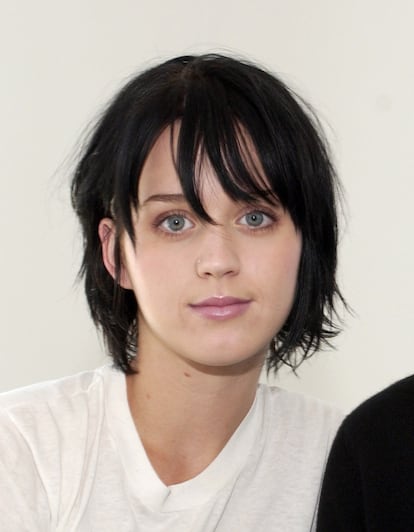
Perry knew how to connect with the millennial sensibility. First, because she was a pioneer in fetishizing pop nostalgia, as seen in the music video for Last Friday Night, which brought together Corey Feldman, Kenny G and Hanson. And secondly for her self-conscious attitude. She was the butt of the joke and joker. She was sexy and at the same time parodied eroticism (like when she wore a bra that spritzed whipped cream, while Lady Gaga’s bra released sparks); she was a cheerleader who laughed at cheerleaders; a winner who behaved like a hopeless loser; a canonical beauty and a pin up caricature; she embraced the clichés of femininity but claimed “not to be like the other girls” (in fact, her first album was titled One of the Boys). She drank beer, belched and laughed at her uncles’ dirty jokes. In her first single UR So Gay she complained that her boyfriend seemed too effeminate. In her hit California Gurls, she sang about how “The boys break their necks tryin’ to creep a little sneak peek at us.” Katy Perry perfected pop as pure escapism: if Mariah Carey personifies Christmas in popular culture, Perry represented summer. It was like she was permanently on vacation. In Katy Perry’s universe, nothing was too important. Nothing was serious.
Her music was helped by iTunes, because the public bought her singles impulsively with a click (she is the only person with three singles that exceed six million downloads and the only woman with a song that has more than 15 million downloads thanks to Roar). But after taking a four-year break, she released Witness in a completely different world than the one in which she had become star. “Katy wanted to be everything to everyone, but streaming drives niche artists,” says Kornhaber. Digital sales and the radio no longer decided which songs were popular. Streaming platforms were beginning to take over, which changed music consumption: now songs are listened to as background music. That fueled the success of artists like Ed Sheeran, Post Malone, The Weeknd and Drake. The algorithm benefits non-invasive songs, sung in whispers with linear production, and punishes bombastic anthems, sung at high volume and with explosive sounds, which is Katy Perry’s specialty. A real-world example: the two most listened-to songs in the world right now are Please Please Please and Espresso, both by Sabrina Carpenter. Her flippant tone and comedic attitude are reminiscent of Katy Perry, but Carpenter sings them in a whisper.
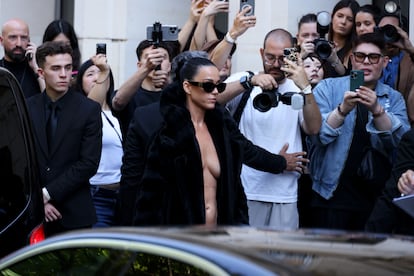
To adapt to this new musical landscape, she released Witness, an album that she herself described as “purposeful pop.” Perry publicly supported Hillary Clinton during the 2016 presidential campaign, going on stage with her at several rallies and even performing at some of them. Donald Trump’s victory led her to question the function of pop music in society and from there, came the single Chained To The Rhythm, a critique of the escapism compulsion to which (as many critics pointed out) she herself had contributed. “When I first came out, we were living in a different mindset in the world,” the singer acknowledged in Rolling Stone. “We were flying high off of life. We weren’t struggling as we are. There wasn’t so much of a divide [...] I just feel like I can’t just put an escapist record out.”
Overnight, Katy Perry went from dancing with stuffed sharks to performing with two giant skeletons dressed as Donald Trump and Theresa May. She changed her Twitter bio to “Artist. Activist. Conscious.” “I feel very empowered,” she declared in a New York Times profile headlined “Katy Perry Woke Up. She Wants to Tell You All About It.”
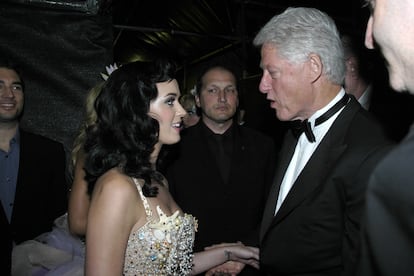
To celebrate the release of the album Witness, Perry locked herself in a house with 41 cameras that broadcast her every move live for 96 hours. While her new album played nonstop, the singer did yoga with actor Jesse Tyler Ferguson, practiced meditation with guru Bob Roth, cooked with chef Gordon Ramsay, attended poetry recitals, talked with racial justice activists who helped her understand how she had appropriated foreign cultures in the past (for example, by performing dressed as a Geisha, or wearing a dreadlock wig) and brought together several high-profile figures for a dinner aimed at “provoking conversations.” Her guests included Caitlyn Jenner, Anna Kendrick, Dita Von Teese and Sia. They had avocado toast and kale salad for dinner. The project, called Witness World Wide, was sponsored by the cosmetics company CoverGirl.
“The confessions felt premeditated,” criticized Amanda Petrusich in The New Yorker. “When they’re plainly staged in service of an album launch, it feels less like an act of altruism or epiphany than cynical calculation.” “Watching Katy Perry’s struggle for relevance has been painful,” wrote Chris DeVille in Stereogum. “Perry has been faltering so publicly that she’s become an object of morbid fascination,” said Lindsay Zoladz in The Ringer.
Katy Perry was criticized like never before: her rivalry with Taylor Swift was considered “not very feminist,” a joke at the expense of Britney Spears (“That’s called taking care of my mental health, I haven’t shaved my head yet”) led to accusations insensitivity and the fact that she collaborated with an openly LGBTphobic group like Migos led many to question her commitment to the collective. Nobody talked about her songs. Everyone was talking about how they didn’t like her short platinum blonde hair.
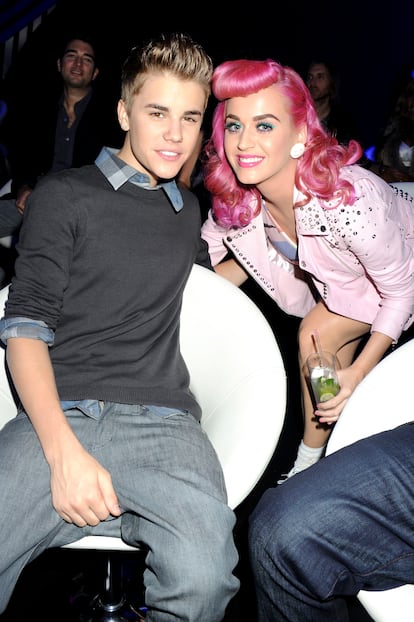
Witness was Perry’s first album without producer Dr. Luke (accused of sexual abuse by singer Kesha in 2014) and the first without big hits or, at least, without the giant numbers of her previous successes. Dr. Luke was behind Katy Perry’s nine No. 1 hits in five years. Since she stopped collaborating with him a decade ago, she has only had four top 50 songs. She herself has admitted that she was obsessed with the charts and that the failure of Witness led to bouts of depression: “I put so much validity in the reaction of the public, and the public didn’t react in the way I had expected it to … which broke my heart.”
Her recent attempts to return in style with the single Women’s World have so far only sparked jokes on social media. When she showed up at a Balenciaga show wearing ripped tights, a faux fur coat with nothing underneath, and a slicked-back high ponytail (a look that would be celebrated if it was worn by Charli XCX), one social media user opined: “It feels like her team is desperately trying to stick a serve to the wall this era... like the whole creative direction is ‘feed the gays’ but they don’t have the recipe.” When she posted the promotional image of the single with a cyber aesthetic, another wrote: “this new trend of failing pop stars (and their management teams) [is] trying to serve manufactured cunt in an attempt to appeal to lowest common denominator gay guys.” Both tweets have more than three million views. Katy Perry has gone from being the joker to just being a joke.
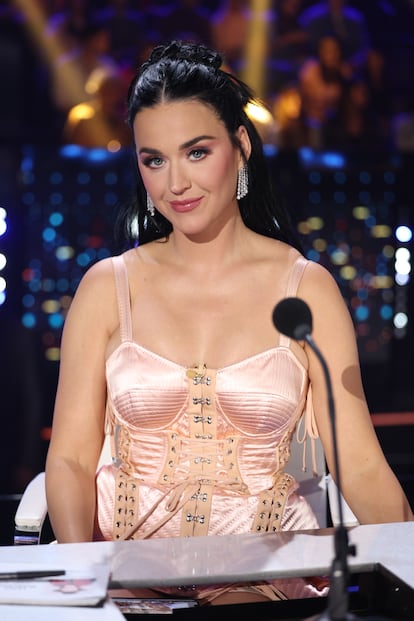
The consensus seems to be that Katy Perry is trying too hard. At a time when pop stars appear lazy and apathetic, a star as calculated and perfectionist as Perry seems like a relic from a past that no longer exists. Billie Eilish, Lorde, Charli XCX, Troye Sivan, Ariana Grande, Sabrina Carpenter, Beyoncé and Taylor Swift are triumphing thanks to something as intangible and undeniable as authenticity. And that’s just what Katy Perry seems to be missing. “There is no science to being a pop star,” says Spencer Kornhaber. “Katy Perry and Charli XCX dress the same and make the same jokes, but what the public judges is whether it works for them or not.” Kornhaber believes that Perry is using the underground aesthetic like a costume. “Massive pop stars have always taken things from the fringe and ended up neutralizing them. Before we didn’t realize. Now we do. If you try to force the camp or the underground cool you are failing in your objective.”
At a time when pop stars present themselves as losers, Perry doesn’t fit in because she always had a certain aura of being privileged and a winner. Even though, paradoxically, she has been losing for seven years. “She has alpha energy, she is pure mainstream. And right now that’s a hard sell in pop. Katy also can’t do the confessional thing. First, because she doesn’t write her lyrics. Second, because no one understands exactly what her problems are,” says Kornhaber. Katy Perry was such a product of her time that she made waves more than anyone else but quickly became obsolete. Today her idea of making out with another girl for the male gaze is called queerbaiting, and getting into a giant pot while a group of Black men cook it... well, that was already questionable in 2017. The joke simply stopped being funny.

“Millennials no longer lead the culture like they did 10 years ago,” says Kornhaber. “And Katy Perry is one of the most millennial artists that exist: she tried very hard, she was self-aware, she knew how to sell herself, she took great care of her image, she always appeared immaculate, she was good at personal branding and had vaguely progressive ideas but deep down she was institutionalist. She worked very within the system. Young people no longer believe that everything will be fine if you operate within the system. Among post-Covid youth, there is a super ironic and even radical nihilism. And there is nothing less nihilistic than Katy Perry. She is stealing the kitsch underground aesthetic, the Berlin, anti-institutional, anti-millennial vibe. But it’s not going to work for her. Now it is very common to seem like you don’t care about anything and Katy is simply not that person. She can’t hide it. You will always notice how much effort she puts into what she does.”
This backlash will be neutralized if Perry has a hit song. To make sure of that, she has once again featured Dr. Luke on her new album. There is already criticism on social media, but there are millions of people who either do not know about the accusations against the producer or don’t care. A mass of people who aren’t on X or TikTok, for whom music is just music, who believe not everything should be politicized. And, at the end of the day, that has always been Katy Perry’s audience.
Sign up for our weekly newsletter to get more English-language news coverage from EL PAÍS USA Edition
Tu suscripción se está usando en otro dispositivo
¿Quieres añadir otro usuario a tu suscripción?
Si continúas leyendo en este dispositivo, no se podrá leer en el otro.
FlechaTu suscripción se está usando en otro dispositivo y solo puedes acceder a EL PAÍS desde un dispositivo a la vez.
Si quieres compartir tu cuenta, cambia tu suscripción a la modalidad Premium, así podrás añadir otro usuario. Cada uno accederá con su propia cuenta de email, lo que os permitirá personalizar vuestra experiencia en EL PAÍS.
¿Tienes una suscripción de empresa? Accede aquí para contratar más cuentas.
En el caso de no saber quién está usando tu cuenta, te recomendamos cambiar tu contraseña aquí.
Si decides continuar compartiendo tu cuenta, este mensaje se mostrará en tu dispositivo y en el de la otra persona que está usando tu cuenta de forma indefinida, afectando a tu experiencia de lectura. Puedes consultar aquí los términos y condiciones de la suscripción digital.








































